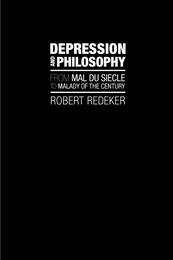Depression and Philosophy
Ph.D; National Centre for Research (Paris);noted French philosopher and controversialist
 This work is, in the words of Dr Norman Freed, a “rich picture of an empty landscape, the depression that is to be engaged to maximally avoid it and its ramifications.” This work explores the philosophical aspects of the plague of depression found throughout the modern world.
This work is, in the words of Dr Norman Freed, a “rich picture of an empty landscape, the depression that is to be engaged to maximally avoid it and its ramifications.” This work explores the philosophical aspects of the plague of depression found throughout the modern world.
Depression, once called melancholy (as in The Anatomy of Melancholy of Robert Burton, of 1621, or closer to us, that “Black Sun of Melancholy” of the suicide Nerval...), according to Robert Redeker—philosopher, teacher, author of half-a-dozen books and many articles and reviews, member of the ‘comité’ of Les Temps Modernes, and recently become a nomadic intellectual, or “scholar-gypsy,” subsequent to Jihadist ‘fatwas’ that were leveled against him after an article he published in the Figaro calling on a ‘terrorist’ Islam to establish its humanist credentials, if there were any to establish—has lost its aristocratic, aesthetic and elitist luster, which it once had in the epoch of Musset’s Confessions, Vigny’s Chatterton, Chateaubriand’s René, Nerval’s El Deschidado, and, of course, Baudelaire’s Les Fleurs du Mal. Redeker shrewdly, even uncannily, locates a prophetically watershed moment in Flaubert’s contemporaneous Emma Bovary, the first of the “desperate housewives”, unprecedented in the fact that her melancholy had nothing to do with its typical etiology of an artist’s alienation from a bourgeois world (say from Vigny’s Chatterton to Artaud’s “Van Gogh, Suicided by Society”) but rather stemmed from the pressures and frustrations of living in society, as from Civilization and Its Discontents we all suffer from, artists or not (maybe nonartists even more, since they can’t make art out of it), as Freud later was to conceptualize the issue...
As a matter of fact in a previous book (Les Nouvelles figures de l’homme, 2004, Le Bord de l’eau; Eng. trans.: The New Face of Humanity, 2007, Academica Press) Redeker had explored the etiology of such common conditions of today as stress and nervousness (divorced from any reasonable cause, or, visibly, any cause at all, as in anxiety as opposed to fear), connecting them with a general ambiance of dysphoria or asthenia fostered by a cultural and political climate of derogation and meaninglessness—for instance one that made mere biological survival (shades of Agamben!), lamentably the only purpose left: life only for the sake of living; we like the slaves, famously of Hegel’s “master-slave dialectic” who have chosen living on over living with dignity, if at risk of death; this providing: “...a soil fertile for nervousness....Everywhere we meet men and women on hot coals, as if being shocked by wires and batteries....The nervous person of today is...representative of dehumanization” (p. 56)
Equally if not more widespread and spreading than the ‘manic’ nervousness and stress limned above, melancholy or depression today, as conceived in Redeker’s book, Depression and Philosophy, may be the other side of this sad psychological seesaw of a syndrome (as in ‘manic-depressive’), with its roots in the same soil, if the flagrant oxymoron may be allowed of a soil for rootlessness; depression rising from our being ‘starved’ of any meaningful tie, connection, bond to ourselves, a world or a cosmos, “A malady attacking
these ties renders human life impossible. The ties which allow habitation are like ropes and cables in mountain climbing and at sea: when they’re unloosened, we are loosened from ourselves, from others, and we’re done for. A feeling of falling is frequent in the collapse which is depression.” (p. 11). Our pandemic depression is also conceived of here as having been accompanied and even facilitated by a corresponding derogation of philosophy from its traditional ‘task’ of providing a stable basis and essence for human existence. However, as with Love the one who inflicted the wound may be in the best position to heal it; or, in the words of the mad, but strangely sane Hölderlin: “there where the danger is greatest, rescue is nearest.”
“Blissfully free of jargon, neo-Marxist cant and crepuscular morbidity rather clean and hard and intellectually bracing… I truly recommend this study.” Professor Louis Glober, AUCAD
ACADEMICA PRESS
1727 Massachusetts Avenue, NW, Suite 507
Washington, DC 20036
